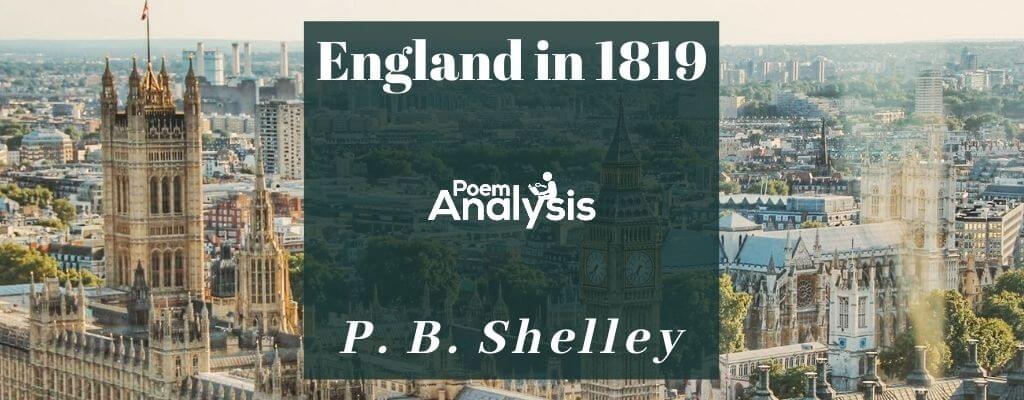‘England in 1819’ is a political poem. It is memorable for its piercing analysis of what was contemporary English society and the hope that things, in one way or another, could change. At the time, due to libel laws, Shelley couldn’t find a publisher who would come near this poem.
England in 1819 Percy Bysshe ShelleyAn old, mad, blind, despised, and dying King;Princes, the dregs of their dull race, who flowThrough public scorn,—mud from a muddy spring;Rulers who neither see nor feel nor know,But leechlike to their fainting country clingTill they drop, blind in blood, without a blow.A people starved and stabbed in th' untilled field;An army, whom liberticide and preyMakes as a two-edged sword to all who wield;Golden and sanguine laws which tempt and slay;Religion Christless, Godless—a book sealed;A senate, Time’s worst statute, unrepealed—Are graves from which a glorious Phantom mayBurst, to illumine our tempestuous day.
Summary of England in 1819
Shelley, or at least the persona he is utilizing for this poem, describing how the king os “old, mad, blind” and even despised at the beginning of the poem. All the aristocracy in fact is corrupt and totally out of touch with their people. Those same people are taken advantage of and forced to suffer for the happiness of the rich. Religion is falling apart and the Senate is a disgrace. The poem concludes with a mysterious and not entirely clear line that might hint at an all-consuming revolution or some other kind of monumental change.
Structure of England in 1819
‘England in 1819’ by Percy Bysshe Shelley is a fourteen-line sonnet that is contained as is traditional within a single stanza of text. The lines follow a rhyme scheme of ABABABCDCDCCDD. This is not a standard rhyme scheme for a sonnet but a reader familiar with Petrarchan sonnets should be able to spot some of the markers of this form. Shelley also makes use of iambic pentameter. The latter is the most commonly used meter in English poetry, especially when it comes to sonnets. This form refers to the number of beats per line and the position of the stresses. With iambic pentameter, each line contains five sets of two beats. The first of these is unstressed and the second is stressed.
Another element that can be found in this sonnet is that of a turn. This is a shift in the poet’s content, the speaker, or the perceptive. It might even take the form of an answer to a question or a resolution to a problem. It usually appears between the first eight-line and the concluding six or before the last two lines of the poem. In this case, the turn is placed after the first six lines, leaving eight lines to conclude the poem.
Literary Devices in England in 1819
Shelley makes use of several literary devices in ‘England in 1819’. These include but are not limited to alliteration, allusion, and caesura. An allusion is an expression that’s meant to call something specific to mind without directly stating it. In this case, there are several allusions to the current (at that time) state of English life. See the analysis portion of this article for more information.
Alliteration occurs when words are used in succession, or at least appear close together, and begin with the same sound. For example, “despised, and dying” as well as “dregs” and “dull” in lines one and two. Caesura occurs when a line is split in half, sometimes with punctuation, sometimes not. The use of punctuation in these moments creates a very intentional pause in the text. A reader should consider how the pause influences the rhythm of one’s reading and how it might precede an important turn or transition in the text. For example, line three: “Through public scorn,—mud from a muddy spring;”
Analysis of England in 1819
Lines 1-4
An old, mad, blind, despised, and dying King;
Princes, the dregs of their dull race, who flow
Through public scorn,—mud from a muddy spring;
Rulers who neither see nor feel nor know,
In the first lines of ‘England in 1819’ the speaker starts off with a bang. He calls the king “old, mad, blind, despised, and dying”. Each of these words comes as something of a shock with their stressed syllables. They also work as a hook to pull the reader in, making someone want to find out more about this terrible king (King George III) and the state of the world in 1819.
The poet goes on, adding that it’s not just the king who is useless, the princes are too. This alludes to the fact that when the king dies, nothing by necessity is going to change. The same type of leadership is lined up for the next generations. They are the “dregs” of the aristocracy and are constantly scorned by the public. The princes take and take without giving anything back. The “Rulers” of England do not understand their own country.
Lines 5-7
But leechlike to their fainting country cling
Till they drop, blind in blood, without a blow.
A people starved and stabbed in th’ untilled field;
In the next lines, the speaker describes the princes and all those or royal blood as “leechlike”. This simile compares them to creatures, far from human, who feed off of others. In this case, they are feeding off society—those they are supposed to protect.
Moving away from the princes and towards those the speaker sees as truly mattering, he adds that the people are “starved and stabbed”. This excellent example of alliteration describes how oppressed the English people are. They are hungry and working without benefits to their lives. These lines might also refer to the Peterloo Massacre that occurred in August of that year.
Lines 8-14
An army, whom liberticide and prey
Makes as a two-edged sword to all who wield;
Golden and sanguine laws which tempt and slay;
Religion Christless, Godless—a book sealed;
A senate, Time’s worst statute, unrepealed—
Are graves from which a glorious Phantom may
Burst, to illumine our tempestuous day.
Shelley describes the army in the following lines of ‘England in 1819’. Here, he says that they are two-sided. They are used by the government to repress the liberty that the English people deserve. The people are further repressed by the laws their government passes. They benefit the wealthy and further harm the poor and middle class.
Religion has also been impacted. It is not, the speaker says, “Godless” and “Christless”. It has lost everything that made it what it was. The bible is sealed shut meaning that it is never read. The principles of religious life are not applied. This relates to “Time’s worst statute” in the following line. This is an allusion to a law under which Roman Catholics were not allowed to vote or sit in Parliament, along with several other restrictions.
All of the things that Shelley’s speaker has mentioned so far are the “grave” that change is going to come bursting out of. At some point, the light is going to come to “illumine” the “tempestuous day” England has been experiencing.




